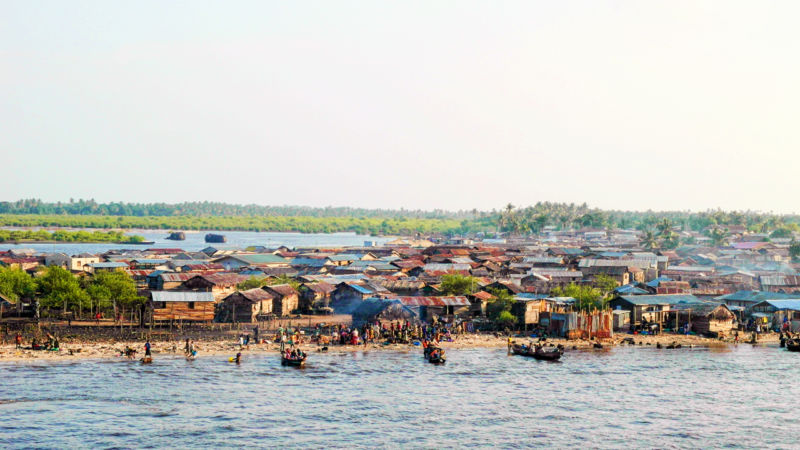The path to a better future for the poorest nations of the world is right under their feet, in the wealth-creating engine of land-rights reform.
When typhoon Haiyan struck the central Philippines in 2013, killing more than 6,000 people and leaving millions homeless, it disproportionately affected impoverished farming communities in the region. More than a thousand of those killed were informal settlers, the landless poor, people too frightened to evacuate because they had no evidence that they belonged there. As a result, they died, as they had lived, in fear that they could lose their homes forever. “Every waking day, we worry about where to find land,” said Patrick de Belen, a resident of the area whose family had been driven out of its home because it did not have a legal deed. After that natural disaster, an Oxfam report put the issue simply: “Security of land tenure is essential to re-establish shelter and livelihoods and to reduce the risks of chronic poverty.”
In cities of advanced economies, clear evidence of land rights is everywhere, embedded in sidewalks, in numbered addresses, and in a long-settled body of property law. In low- and middle-income countries, though, U.N. research shows that an astonishing 70 percent of the land has no registered owner and therefore cannot be easily or reliably bought or sold. That leaves a continent-sized hole in the global property market.
Research conducted by the Peruvian economist Hernando De Soto estimated the asset value of that unregistered land at $9.3 trillion. That is a clearly an enormous sum—between two and three times the total U.S. money supply, more than the value of all the companies on NASDAQ. But the land in advanced economies is worth many times more than $9.3 trillion, and adding the value of what has been built on top of it brings the total value of real estate in high-income countries to an astonishing $217 trillion.
That is the long-term result of what a legal title can do: It makes land into an asset with established value that can be used as collateral for loans, the kind of leverage that creates new wealth. The resulting growth increases property values, which increases the landowner’s ability to borrow and build, which further increases property values, and so on, in a virtuous circle of increasing prosperity.
By contrast, De Soto calls the world’s $9.3 trillion in untitled land “dead capital.” It is dead, he explains in The Mystery of Capital, because land with no legal owner in an unregulated property market has no stable value. Without that, it’s practically useless as collateral for even small loans to finance a house or small business.
Changing that involves the creation of a rigorous and fluid system for land-registration that, while difficult to implement, can change everything for low-income countries. Which, of course, begs the question why, given the stubborn economic troubles of much of the world, so much land still has no legal owner.
For some countries, the biggest barrier is a byzantine system of land management that makes it difficult and extremely time-consuming to collect and keep track of standardized property records. An investigation by The Economist found that trying to get title to a squatter’s home in the Philippines “can require 168 steps involving 53 public and private agencies and taking 13 to 25 years.”
Some governments resist reform because of the years of technical and complicated work necessary before the effort begins to yield results. In other cases, the resistance comes from self-interested landowning elites opposed to any reform that could redistribute property wealth and so upset an inherently inequitable status quo. Such inequities only serve to fan social unrest, curb development, and entrench a state of destitution.
The reward for tackling the issue of land rights, however, is enormous. South Korea is a case in point. After the Korean War and well into the 1960s, the people of North Korea were actually better off than those in the South. Then the South Korean government began to modernize their land-management system, and the results were startling. While the North stagnated and declined into generations of poverty and worse, South Korea boomed. Official statistics released last year showed that real estate accounted for almost 90 percent of the country’s national wealth.
Thailand showed how that happens with a program that began in 1984 to register the 88 percent of its land that had no legal owner. By 1992, when the program ended, 13 million households had received title to their land and had begun to experience the virtuous circle that leads to national prosperity like South Korea’s. Property values increased by 75 to almost 200 percent, and new private sector financing gave landowners the leverage needed to increase their personal wealth. Liberated from informal loan arrangements, access to the official credit market doubled, and their interest rates dropped by a quarter.
In Thailand, South Korea, and other countries that address the land-rights issue, rising property values also mean rising tax revenues, which allow good governments the resources to do what it takes to build healthier societies: funding new schools, hospitals, roads, and social services, including the courts and law enforcement critical for a stable society. Research by the U.S. Agency for International Development, the World Bank, and other global organizations also correlates better land-rights management to more enlightened local and national policies affecting everything from climate change and food security to rates of crime and disease.
Land-rights reform doesn’t solve every problem, but the failure to address it entrenches poverty, corruption, stalled economies, and social instability, while driving away foreign investment and stalling job growth. In Myanmar, where land rights are woefully lacking, fields have been routinely seized from farmers with little or no compensation and transferred to foreign-based companies.
One reason governments hesitate to take on land-rights is the complexity of implementing it, but new technology has made the transition far easier than it once was. That was the case for Cross River, a state in the southeast corner of Nigeria. In a land of breathtaking waterfalls and tropical rainforests, a place known as “the people’s paradise”, its three million citizens actually had “no peace of mind,” says Bassey Oqua, Cross River’s former commissioner for lands. The reason was an absence of land rights: “You could never be sure if the land you lived on was really yours.”
At that point, 97 percent of the land in Nigeria was unaccounted for, and it took from six months to four years to register a deed. One major effect of that was to constrain the construction of new hotels and other accommodations for travelers to Cross River, which is one of Nigeria’s main tourism destinations. Foreign investors do not put money into a country where the title to a building site is anything less than transparently clear and absolutely secure.
With that in mind, the state government of Cross River partnered with Thomson Reuters and Teqbridge, a private Nigerian technology company, to upgrade their land-management system. It took time to implement, but the result is that what was once a collection of tattered papers and ambiguous processing fees and procedures is now computerized, with a fixed schedule of government-set fees and a process that takes only a week. Two months after switching to the company’s Aumentum software, says Brian Peccarelli, president of Thomson Reuters Tax & Accounting, “more search and registry fees were collected…than in the entire four years before.”
The effect on the people of the region, says Commissioner Oqua, has been profound.
“For our people, there is now a sense of security,” he says. “Your land is your land.”
Hopeful as examples like Cross River may be, they mark only a beginning. More than a billion of the world’s poor are rural residents who still have no secure legal right to live where they live. Most of them must either cultivate other people’s land for meager pay or work land that they don’t officially own, consigned to live in fear of sudden displacement. And in some countries, laws that circumscribe the very meaning of ownership and limit the right of women to own land at all curtail the benefits of land-management reform.
All that said, legal land registration in countries without such exceptions brings multiplier effects that go beyond those directly attributable to rising tax revenues and access to credit, beginning a flow of international investment, expansion of the industrial base, new construction, an increasingly robust job market, and, ultimately, the social safety nets and modern infrastructures that mark the way to a nation’s growth and economic security.
It also makes an unsettled people into citizens. “Home ownership gives you a stake in society,” says Nigeria’s former finance minister Ngozi Okonjo-Iweala. “It puts a roof over your head. It gives you an asset. It makes you feel you have accomplished something. This is a common wish that everyone has.”
View the story as it originally appeared on The Atlantic.
Learn more
Explore more answers on land rights.
Plus, check out How can a technology partnering strategy land sustained results?






